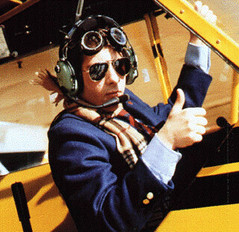Country Music Sucks, Except For Actual Country Music: Or, Why We Should All Buy Subscriptions To No Depression
I hate country music. My sister and I were forced to listen to it in the car when we were young, and prolonged battles finally allowed us to switch the family station to oldies. But from 1987 to 1996-7, I was immersed in mainstream country music, and that history gives me the license and more than enough motivation to say that country music, as it is known, is genuinely awful. It's cloying, derivative, poorly written and cheaply made. It panders to the uneducated, and revels in it.
In fact, country music isn't actually country music: it's watered-down, heavy-handed, disposable pop with a few steel guitars instead of Britney's syncopated moaning. For all of the antagonism most country fans show pop music (traceable to country's grasp on Middle-America's hearts, minds, votes and wallets), modern country music and Top 40 pop have more in common than either would like to admit. The strongest example of this is the latest single from Tim McGraw featuring Nelly (or Nelly featuring Tim McGraw, depending on which station you listen to): it's a bad song about missing someone, with the drum loops and twangy groans in perfect balance. This stuff flies off WalMart's shelves.
But real country music today mostly goes by the title "alt-country" ("whatever that is"), and contains more heart and skill than any thousand songs by Toby Keith. Keith, it should be noted, is symptomatic of the arrogant xenophobia so popular throughout too much of America today; he's Bill O'Reilly's musical (barely) counterpart. But I digress.
So, I'm here to offer some help. Below are some simple tips and suggested listening for anyone who believes that music with a steel guitar can and should be good, and anyone who hates anything about what passes for country music these days.
1. Stay out of Nashville.
This is fairly obvious, but that's why it tops the list. Nashville is a cookie cutter for country stars, a tired old assembly line where no singer writes their own songs and no songwriter holds their head high. The town produces bland, tasteless, downright godawful music about subjects best left to Hallmark cards or White House press releases. If you want real music, you won't find it here.
2. Cut off contact with modern country.
This means no radio, CD purchases, etc. Overhearing the latest Brooks & Dunn masterpiece while standing in line to get your oil changed is forgivable; nodding your head to the beat is not. This brings me back to...
3. Seriously, stay out of Nashville.
Pick up the latest issue of No Depression, a magazine that claims to be unable to define alt-country, though it does a great job representing the cause. Listen to bands from Texas, Oklahoma, Arizona ("all roads lead back to Tucson," after all), or anywhere. But chances are the salvation you seek cannot be found in Tennessee.
4. Listen:
The beauty of alt.country is its wide net of inclusion; it's more of an anti-movement than a movement. Give the following a look.
Uncle Tupelo
Wilco (particularly A.M. and Being There)
Son Volt
The Refreshments (particularly The Bottle & Fresh Horses)
The Jayhawks (particularly Tomorrow the Green Grass and Rainy Day Music)
Ryan Adams (particularly Heartbreaker)
Old 97's
Whiskeytown
Roger Clyne & the Peacemakers (particularly Honky Tonk Union)
Bright Eyes (particularly I'm Wide Awake, It's Morning)
The Pistoleros
Johnny Cash (particularly every record he ever put out, but get a hold of the American recordings)
Gram Parsons
The Byrds' Sweetheart of the Rodeo
And those are just the artists or albums that fall under the general heading of alt-country. Songs that fit the bill pop up everywhere, from "Rain King" to "Hung Up On You." The trick is knowing where to look, and where not to look (e.g., don't look in Nashville. Ever.).
Regular visitors to this site might recognize some of the above names, which is a sad indication that they visit this site too much and should be doing better things with their day, like going right out and buying the albums I've listed so that their lives might be considered worthwhile.

